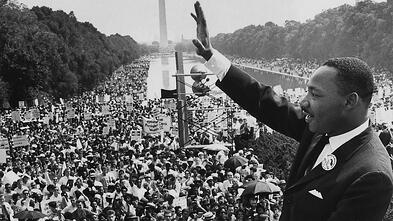Our 2025 Sustainability Report is here! Dive in.
Understanding the Dream
January 20, 2020 •Mark Sebree

On August 28, 1963, Martin Luther King Jr. gave his famous I Have a Dream speech in Washington D.C., exclaiming, “Five score years ago, a great American, in whose symbolic shadow we stand today, signed the Emancipation Proclamation. This momentous decree came as a great beacon light of hope to millions of Negro slaves who had been seared in the flames of withering injustice. It came as a joyous daybreak to end the long night of their captivity. But one hundred years later, the Negro still is not free.” Today, some fifty-six years later in 2020, one may ask, what does this have to do with me? The answer is this: It has everything to do with each one of us as some still lack freedoms in various ways today. What do I mean?
Slavery is solely not limited to forced captivity of a race of people but comes in many different forms. Millions today remain enslaved to energy inequity, domestic terrorism, opioid addiction, racism, bigotry, sexual abuse, natural disasters and abject poverty—to name just a few examples. To complicate matters further, world conflicts are much closer to home than at any other time in history. Many are enslaved to fear of terrorist attacks. Our world is now quite small, thanks to technological advances. It only takes approximately 51 hours to fly around the earth on a commercial aircraft, and some military missiles can fly halfway around the earth in less than an hour. So, like it or not, we really are in this together! This is heavy stuff, and we can’t solve it in a day, so where do we go from here? What’s the “one thing” we can do to chip away at the dream killer?
forms. Millions today remain enslaved to energy inequity, domestic terrorism, opioid addiction, racism, bigotry, sexual abuse, natural disasters and abject poverty—to name just a few examples. To complicate matters further, world conflicts are much closer to home than at any other time in history. Many are enslaved to fear of terrorist attacks. Our world is now quite small, thanks to technological advances. It only takes approximately 51 hours to fly around the earth on a commercial aircraft, and some military missiles can fly halfway around the earth in less than an hour. So, like it or not, we really are in this together! This is heavy stuff, and we can’t solve it in a day, so where do we go from here? What’s the “one thing” we can do to chip away at the dream killer?
First, we must try to understand, as individuals, that we are all in this thing together. There are strong winds of division constantly blowing individuals and groups into isolated corners to stifle dialogue and understanding. What can you do as an individual? Fight those divisive winds by fostering dialogue to come to a better understanding of others’ experiences and perspectives. Try asking questions rather than making assumptions. Keep an open heart and mind on the topic. Do research and come up with answers to inform your views. How about the inclusivity of our interactions? If we only run in homogeneous circles, we will most likely be informed with limited information.
Try this as a self-test: If you are on social media, look at your social media photos and find individuals with differing backgrounds. Remember, backgrounds cover many areas of life and are not solely limited to race. Could you make room for others with differing backgrounds and perspectives? How about having lunch or coffee with someone in a different generation or with a different background?
What’s another “one thing” each of us can do to help someone’s dream? You’ll notice I listed energy inequities first on that list above. Did you know low-income neighborhoods tend to be hotter than their wealthier counterparts? That was the finding of an investigation NPR did last fall with the University of Maryland's Howard Center for Investigative Journalism. Those hotter neighborhoods are not only poorer, they are also disproportionately communities of color. Now, new research suggests that pattern was locked in nearly a century ago. Listen to the podcast at https://www.npr.org/transcripts/795961381. Also, a recent University of Michigan study revealed the cost of energy-efficient products was higher and availability of those products was lower in poverty-stricken areas. This is where we come in!
Each year, Franklin Energy partners with utilities to positively impact millions of low-income homes. Early in my utility career (30 years ago), I saw firsthand the results of energy inequities. Many low-income families were relegated to living in extremely leaky houses that lacked any insulation, energy-efficient lighting, and central heating and cooling. As part of the Franklin Energy team, we provide a crucial service. It’s very rewarding to hear success stories as we assist families by making their homes more comfortable and efficient. That’s a dream come true! Here at Franklin Energy, our purpose is to help all people use the world's precious resources more efficiently.
I’m sure Dr. King would be proud of the “one thing” we’re doing. But we will never rest on our laurels as there’s always much more to do! Dream big and dream often!

